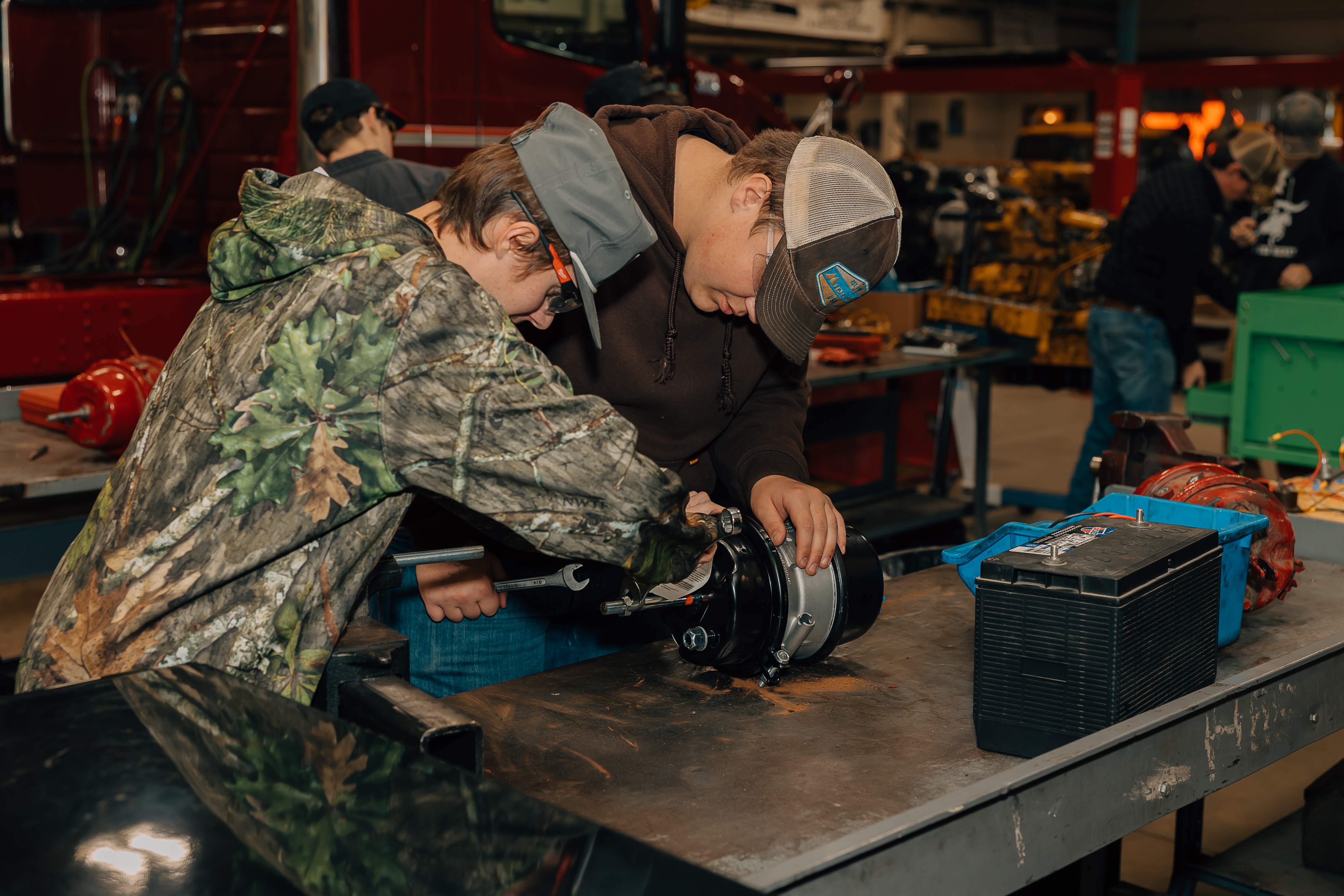Diesel Mechanics
About the Program
Powering Industry. Driving Careers.
Do you have a passion for big machines and solving real-world problems? The Diesel & Heavy Equipment Mechanics program at UTC is your gateway to an exciting, high-demand career keeping the world moving. From massive construction rigs to farm equipment and transport trucks, diesel mechanics are the backbone of industries that never stop.
🔧 Year A: Brakes & Suspension
Master the fundamentals of steering, braking, and suspension systems.
Get hands-on experience diagnosing and repairing hydraulic and air brake systems.
Learn precision alignment, wheel balancing, and axle repair to ensure peak performance.
⚙️ Year B: Engines & Diagnostics
Dive into diesel engine technology, from fuel systems to turbochargers.
Develop troubleshooting skills using industry-standard diagnostic tools.
Explore advanced electronic control systems and emissions technology.
🚛 Why Choose Diesel Mechanics?
✅ In-Demand Skills – Diesel techs are essential across industries like construction, trucking, agriculture, and forestry.
✅ Hands-On Learning – Work on real equipment in a shop environment using the latest diagnostic tools.
✅ Career Ready – Graduate prepared for industry certifications and high-paying jobs right out of high school.
Whether you want to work in a repair shop, join a fleet maintenance team, or even start your own business, this program puts you in the driver’s seat for a rewarding career.
Are you ready to get your hands dirty and build a future in Diesel Mechanics? 🚜🔩🔋
#DieselTech #HeavyEquipmentHeroes #PoweringIndustries


Glen Ayres
Memberships
SkillsUSA, National Technical Honor Society, professional orgs
Skills Developed in This Program
A Heavy Equipment Maintenance program equips students with a diverse set of skills to excel in the field. Here are key skills students typically learn:
Mechanical Skills: Understanding the operation and mechanics of heavy equipment, including engines, hydraulics, and transmissions.
Diagnostic Skills: Ability to identify and troubleshoot issues with heavy machinery through diagnostic tools and visual inspection.
Technical Proficiency: Mastery of tools and equipment used in heavy equipment maintenance, including wrenches, diagnostic software, and welding equipment.
Safety Procedures: Knowledge of safety protocols to ensure personal and workplace safety when working with heavy machinery.
Welding and Fabrication: Skills in welding and metal fabrication to repair or modify heavy equipment components.
Electrical Skills: Understanding and diagnosing electrical systems in heavy machinery, including wiring and electronic components.
Hydraulic Systems Knowledge: Proficiency in maintaining and repairing hydraulic systems commonly used in heavy equipment.
Preventive Maintenance: Ability to perform routine inspections and preventive maintenance to ensure the longevity of heavy machinery.
Documentation: Keeping accurate records of maintenance activities, inspections, and repairs for reference and compliance.
Communication Skills: Effective communication with team members, supervisors, and clients regarding maintenance tasks and timelines.
Problem-Solving: The capacity to analyze complex issues and develop effective solutions to keep equipment in optimal condition.
Time Management: Prioritizing tasks efficiently to meet deadlines and minimize equipment downtime.
Adaptability: Being flexible and adaptable to different types of heavy machinery and evolving technologies.
Customer Service: Interpersonal skills for interacting with clients, understanding their needs, and providing excellent service.
Teamwork: Collaborating with other technicians and professionals to efficiently complete maintenance tasks.
Occupations in This Field:
Heavy Equipment Mechanic: Diagnoses, repairs, and maintains heavy machinery such as bulldozers, cranes, and excavators.
Diesel Mechanic: Specializes in the maintenance and repair of diesel engines commonly found in heavy equipment.
Mobile Service Technician: Travels to job sites for on-the-spot repairs and maintenance of heavy equipment.
Field Service Technician: Conducts maintenance and repairs on heavy equipment directly at job sites or in the field.
Equipment Inspector: Evaluates and assesses the condition of heavy machinery to identify potential issues and recommend maintenance or repairs.
Hydraulic Technician: Focuses on the maintenance and repair of hydraulic systems commonly used in heavy equipment.
Welder: Performs welding tasks to repair or modify metal components on heavy machinery.
Electrical Technician: Specializes in the maintenance and repair of electrical systems in heavy equipment.
Shop Supervisor: Manages and oversees the operations of a heavy equipment maintenance facility.
Parts Specialist: Manages and organizes the inventory of replacement parts for heavy equipment.
Service Manager: Coordinates and supervises the maintenance and repair activities within a heavy equipment service department.
